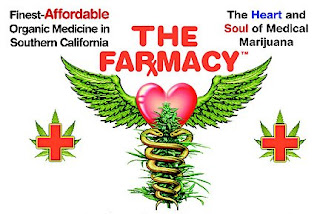Precedential No. 32: Double Entendre Argument Remedies "THE FARMACY" 2(e)(1) Refusal, Says TTAB
The Board fell for Applicant Tea and Sympathy's claim that The mark THE FARMACY is a double entendre and therefore is not merely descriptive of "retail store services featuring natural herbs and organic products; and on-line retail store services featuring natural herbs and organic products" (in International Class 35), and "providing integrated health services at retail locations in the nature of dietary and nutritional guidance and providing information about dietary supplements and nutrition" (in International Class 44). And so the Board reversed the PTO's Section 2(e)(1) refusal to register. In re Tea and Sympathy, Inc., 88 USPQ2d 1062 (TTAB 2008) [precedential].

The Examining Attorney argued that the mark describes the place where Applicant's services are dispensed, and the purpose of the services: "applicant sells organic herbs and products in a health and medical environment that is essentially a pharmacy with just a different phonetic spelling."
Applicant contended that the mark is "a whimsical term, as a play on the words 'pharmacy' and 'farm,' meant to connote the idea that applicant 'is selling farm fresh, natural, pure and completely unprocessed products." According to applicant, the consumer must make a "mental leap" in drawing a connection between the mark and the services.
The Board sided with Applicant. "Consumers are not likely to perceive that mark as just a misspelling but rather a play on the natural or farm-fresh characteristics of applicant's herbs and organic products used for medicinal purposes featured in applicant's services." [TTABlog query: where in Applicant's recitation of services does it say "farm-fresh" or "medicinal purposes'?]
According to the Board, Applicant's mark conveys a dual meaning, "that of the natural aspect of the goods sold by applicant and of a pharmacy." The mark is "just clever enough, being an obvious play on 'the pharmacy' and 'farm', so that the meaning or commercial impression of applicant's mark will be more than simply 'the pharmacy.'" Likening this case to one involving the mark "MufFuns" for muffins, the Board reversed the refusal.
TTABlog comment: I find it interesting that the Board never mentioned its precedential ruling in the THE GREATEST BAR case, In re The Place, Inc., 76 USPQ2d 1467 (TTAB 2005) [TTABlogged here], wherein it rejected a double entendre argument because a mark "is deemed to be a double entendre only if both meanings are readily apparent from the mark itself."
Here the double entendre in the mark THE FARMACY is recognizable only if one knows that Applicant's services are offered in a farm setting. Otherwise, THE FARMACY looks like nothing more that a case of poor spelling.
In the "MufFuns" case, the double entendre is evident from the mark itself, since the word "fun" does indeed lend a whimsical aspect to the mark. But the word FARMACY has no such whimsical meaning; only if one knows of the actual farm setting of applicant's services does the second meaning appear. Nowhere in Applicant's class 35 recitation of services is there any mention of a farm, or farm-fresh products, and in the class 44 recitation even the words "natural" and "organic" do not appear. And how do "on-line retail services" have anything to do with a "farm-setting?"
Seems to me that this is virtually the same situation as in THE GREATEST BAR: you don't get the "joke" until you visit the place.
Text Copyright John L. Welch 2008.




0 Comments:
Post a Comment
<< Home